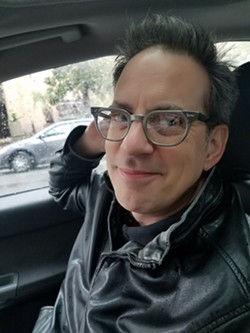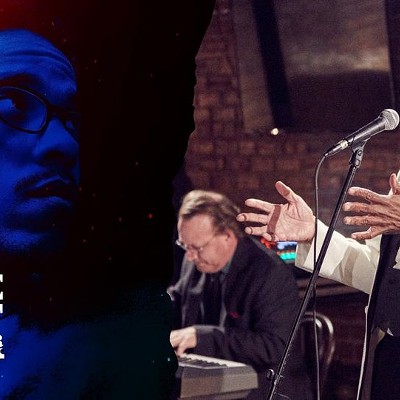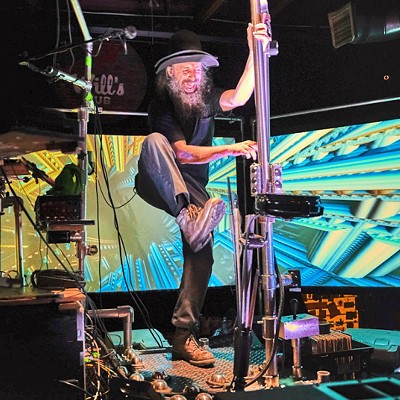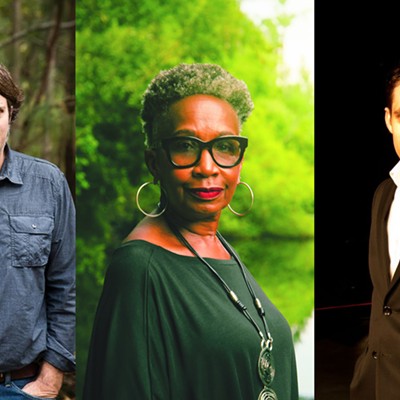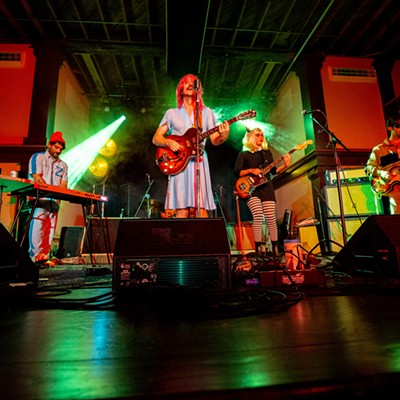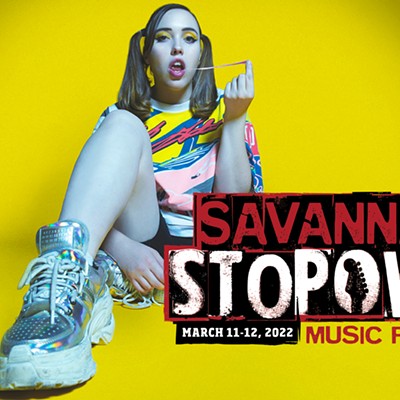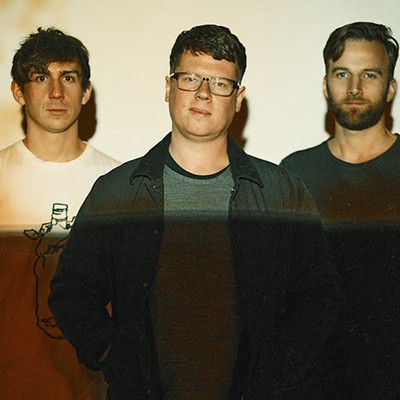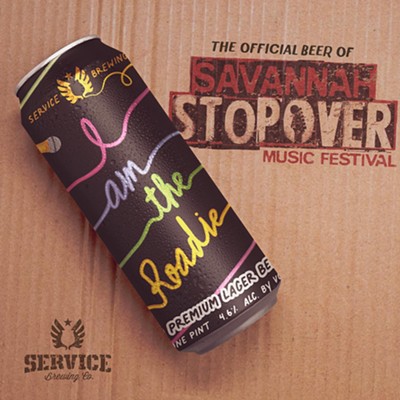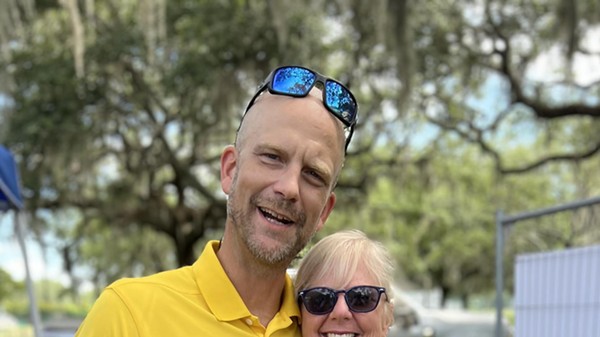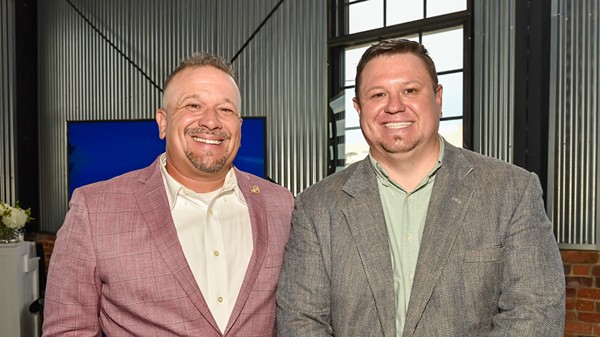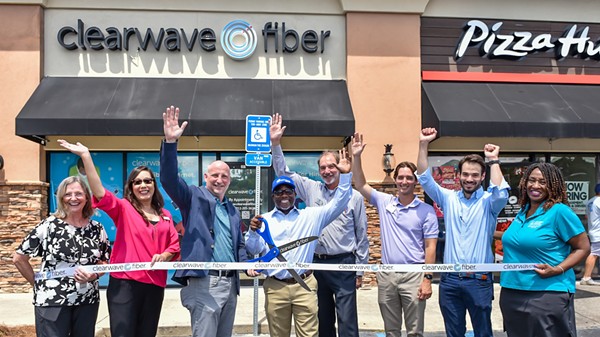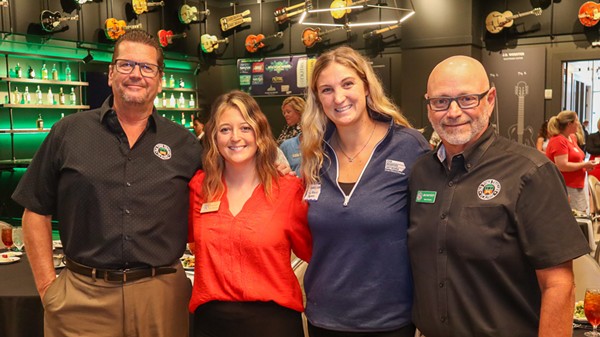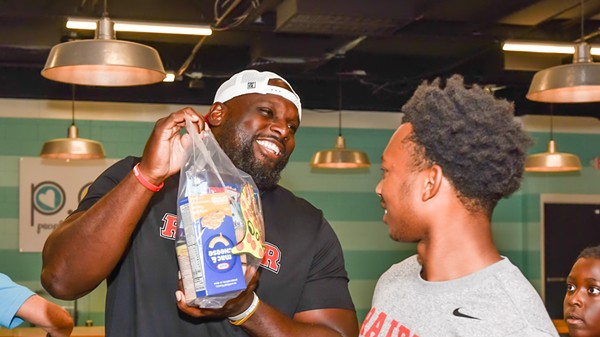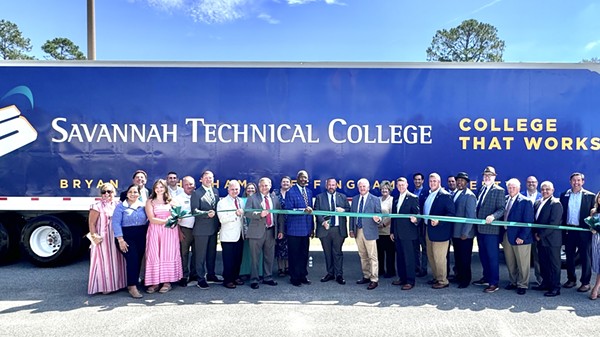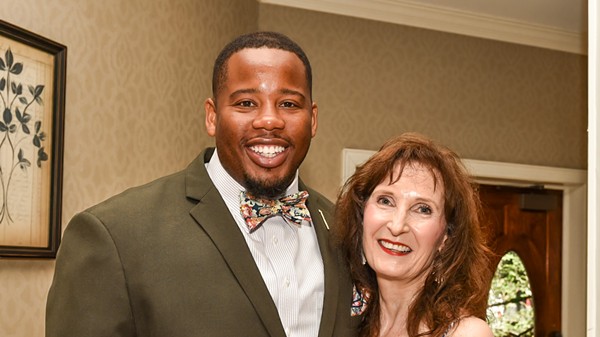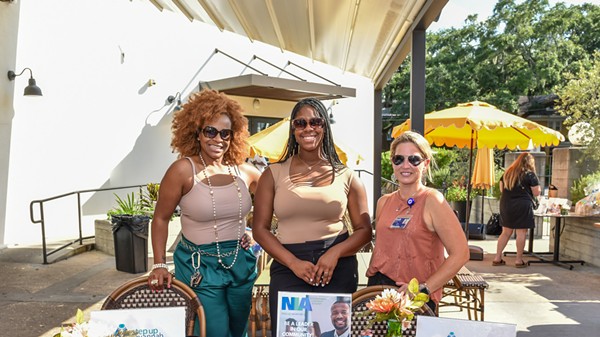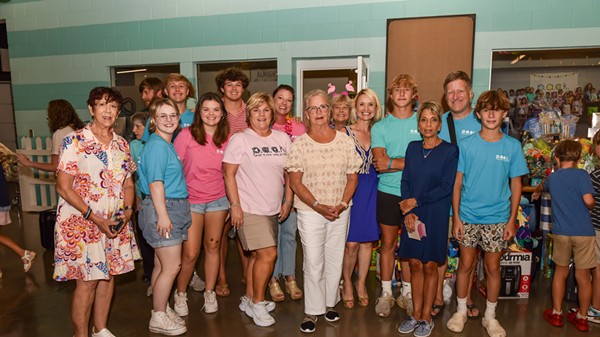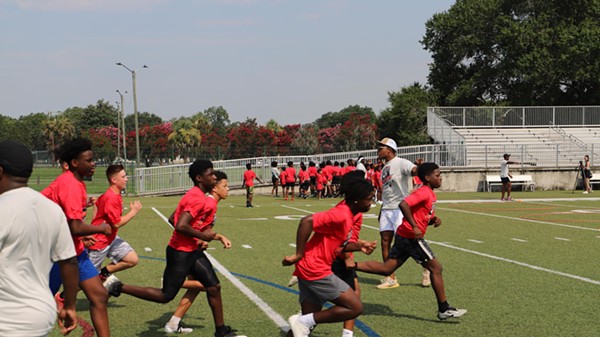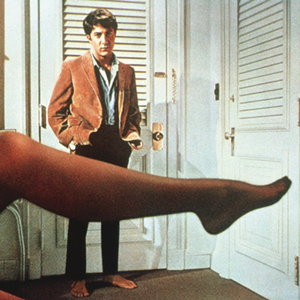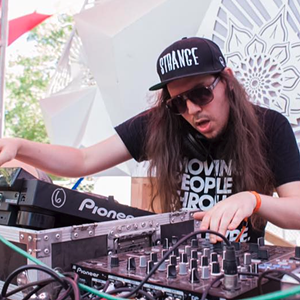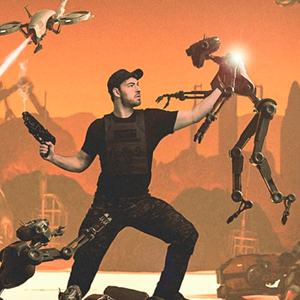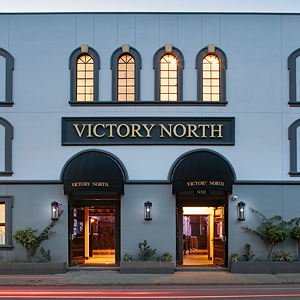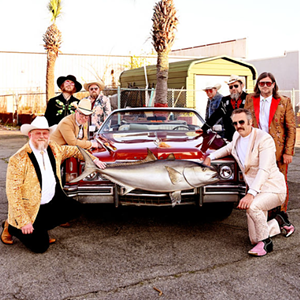JIM REED is something of a Savannah legend. As a member of bands like Superhorse and City of Lindas, Reed has been part of the fabric of this city’s music scene for decades.
He’s also been at the forefront of preserving a city that fosters cinema, thanks to his long-running Psychotronic Film Society events and screenings.
Now, he’s launching Fake Fangs—a label that will focus heavily on re-releasing rare, out-of-print and underappreciated gems from the city’s musical history books. He will also work to give currently active local artists a home for back catalogs.
First up for Fake Fangs is Pineapple Upside-Down Tape, a compilation that includes one his legendary bands among other local and regional bands, and was recorded and released in 1997 by Bill Hodgson and Kevin Rose (at the original Elevated Basement studio). It’s being remastered by Rose at his studio.
Ahead of the launch of the Fake Fangs store on August 7, we spoke to Reed about the exciting new label.
When exactly did the idea come about?
It’s probably been 15 years since I first came up with the concept for what has finally come to be known as Fake Fangs Records. There have been plenty of times over that period where I tried to goad myself into making good on the idea. But I could never find the time or energy to devote to it. The enthusiasm was always there, but logistically it just didn’t make sense.
A few months into this pandemic lockdown I found myself extremely depressed and demoralized, and a big part of that had to do with the fact that regularly playing live rock, Americana and soul music in bars, clubs and restaurants was much more than a steady source of my meager income, it was an emotional and creative release that I had become accustomed to for decades.
Also, because I play the drums in a fairly dynamic fashion, and often am called upon to sing at the same time for shows that last three to four hours a night, it was a very unusual and demanding form of physical exercise that I actually enjoyed.
I mean, it’s easy to give up and just sit on a couch when you’re doing push-ups by yourself, but if a room full of people are watching you and some friends do those push-ups together and you’ve all signed a contract that says you won’t stop doing them till two in the morning, it kind of forces you to stay in shape, you know?
"Dances"
Greg Williams
Greg Williams' "Dances" from the upcoming reissue of 'Pineapple Upside-Down Tape,' out on Fake Fangs Records
I have close friends who work in various behind-the-scenes aspects of the live entertainment world at the national level, and so I suppose I wound up realizing a bit earlier than most musicians just how devastating and long-term this health crisis would be to the entire notion of people going out to enjoy live performances of any sort for years to come.
At that point, I realized it would behoove me to try and come up with some sort of alternate plan to bring in a bit of revenue, no matter how small. I was also concerned for my fellow working musicians, as most of their livelihoods had been devastatingly impacted in the same way.
One night my mind was racing and I just couldn’t sleep. I remembered this business plan I had developed over a decade ago and realized that, while it was by no means a big moneymaker, it was —in a strange way— almost uniquely suited to this strange time we are living in.
Did quarantine shape the vision/model for Fake Fangs, in terms of the state of the industry?
The recording industry now is, for most of us, a sad joke. I came of age playing in alternative rock bands in the late 1980s through the late 2000s, and during that time, everything shifted. In some ways for the better, but in many ways for the much, much worse.
It’s one of the reasons so many talented artists who have huge fanbases are still basically going bankrupt now. The advent of streaming services like Spotify is very convenient for consumers, but the entire basis of their business model is “legalized criminality.”
They pay insulting low rates to the creators and performers whose music is their sole inventory, and often ae given permission to do so by record labels who own artists’ music – even if the artists themselves want no part of such a deal.
The only way for people to truly support the musicians who bring them joy through their recorded music, is to purchase that music, and ideally to purchase it directly from the artists themselves, so there is no middleman.
However, middlemen have gotten something of a bad rap over the years, because so many of them are crooked. They’re not musicians or artists themselves, like Daniel Ek, the CEO of Spotify. They are more than happy to screw over the musicians if it makes their company more profit.
I, on the other hand, am a struggling musician myself, and I know exactly how rotten it is to be taken advantage of in this way. So, I have structured the business side of Fake Fangs to be as “artist-friendly” as it can be, while still hoping to remain solvent.
Fake Fangs will be paying significantly higher royalties to its artists than most any other indie label that I have found, and we are doing that specifically because I realize most of the artists on this label aren’t going to sell a ton of CDs or digital downloads.
Tell me about the original Pineapple Upside Down Tape, and the story behind it. It’s a historical document in the history of Savannah music.
Decades ago, Bill [Hodgson] had what was very cool consumer-oriented analog gear at the time, but which would not have been seriously considered for use in a professional recording studio. As I recall he had a really odd little 4-track recorder that used standard audio cassettes, but was not the typical Tascam-style Portastudio most recording aficionados would remember. This deck used some sort of strange interface, and the recording heads were aligned in a proprietary way, which meant you could basically only use the tapes on the exact same machine they’d been recorded on. I think the format did not take off, and so he was left with this odd little deck.
Bill would primarily use it himself to record his own group’s songs and his own demos. We’d sometimes use it to record live shows by local bands or by bigger-name acts that came through town on tour and were friends of ours.
At some point, I believe he decided he needed a place to record that had more space and perhaps different acoustics than his house, so he wound up renting a dusty old commercial space that had been used for storage by an existing business that occupied the front of the building.
My friend and bandmate Kevin F. Rose had come onboard in a more official sense to help Bill upgrade the studio with slightly nicer gear: better microphones, proper pre-amps and outboard processors, an analog reel-to-reel deck that I believe might have been an 8-track machine – and they began allowing local musicians to come record there for a small fee.
Bill and Kevin were both self-taught recording engineers, but Kevin is an architect by trade and had a keen interest in the actual mechanics and physics of how audio recordings are made. He also possessed the kind of analytical approach to problem-solving that allowed him to dive in and really run with this new vocation.
Kevin soaked up as much knowledge as he could very quickly and that led him to what he is today: a top-notch recording and live sound engineer who’s able to walk into most any serious studio or 3,500-seat venue anywhere and hold his own.
Ultimately, Kevin became the sole proprietor of Elevated Basement Studios, redesigned and rebuilt the place from the ground up, and for decades now it has been one of the finest tracking and mixing facilities of its size on the East Coast.
But back in 1997, most of those upgrades and changes had yet to occur. Bill felt strongly, as I did and still do, that it was important to document as much of the amazing original music that was being made in and around Savannah at that time. He also wanted to spread word that his little DIY studio was now open for business to anyone who wanted to book a session. The most logical way to do that was to create a compilation showcasing not only what he thought were some of the most impressive and unique local acts, but the abilities of he and Kevin to make those acts sound good on a very small budget.
Some of the 13 acts which ultimately were invited to be included on the “Pineapple Upside-Down Tape” recorded their contributions specifically for that collection, while a few had already or were then in the process of recording demos or tracks they intended to use on commercially released EPs or LPs, and they agreed to give a sneak preview of their own albums by donating a track to this compilation. So, it is my understanding that the first time any of these recordings appeared publicly was on this collection.
What can you divulge about the future for the label/what’s in the pipeline?
I am thrilled to say that I already have verbal commitments and handshake deals with several really outstanding musical acts from our area that are no longer together, but who have some very cool but under-appreciated records in the can. I am looking forward to Fake Fangs being the exclusive, authorized home for their back catalogs – some of which was available commercially at one time or another and some of which has never been made available to the public before.
I am also really happy to be working with a few very well-known and respected local artists that are currently active, and it looks like we’ll not only be remastering and reissuing their out-of-print albums (and in some cases doing deluxe, expanded versions of those records with additional rare or previously unreleased bonus tracks and detailed liner notes), but helping them to release brand-new albums of original material in the future.

